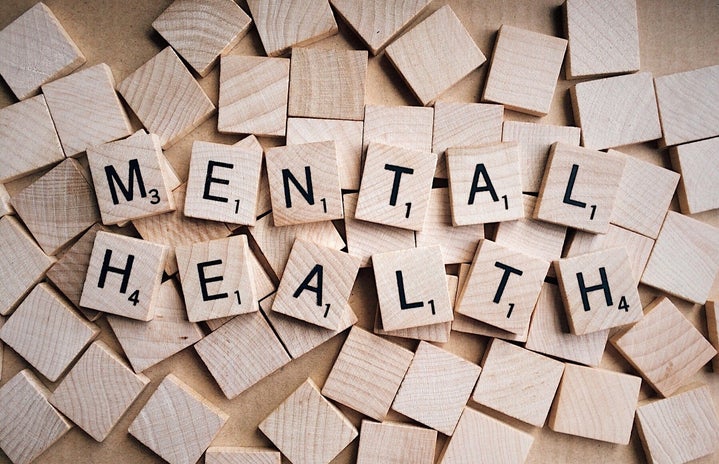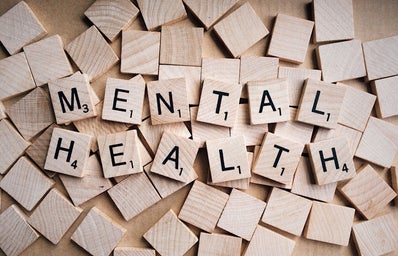When people talk about mental health in college, we often hear about self-care tips like face masks and getting enough sleep. These can be very beneficial to our mental health, but many people struggling with mental illness and/or trauma need more than traditional self-care to make it through the day, and it really comes down to listening to what our bodies and minds need. Here are some ideas that have helped me and may help you.

Talk to your professors
Many professors are understanding and should be, and letting them know a little bit about what is going on can go a long way. Some may give you extensions on an essay if you are having an extra hard time the week it is due or will help you get through your assignments. Most of them want us to be happy and healthy and know that we are able to actually learn the material.

Let go of perfection
Perfectionism often goes hand and hand with mental illness. But perfection does not exist. We all have the “best” that we can do, but it is unfair to expect you to do as good at school, at work, etc., while in differing circumstances. Our best changes every day. What is your best today is different from what it was yesterday and what it will be tomorrow. We can only ask ourselves to be our best for that moment, and that might be taking a nap or not studying as much as you would have last semester for a test.

Let yourself ask for or have what you need
This goes along with talking to your professors often. If you feel you need an extension on something or need to miss class, only you can ask for those things. Make sure you identify what you need and what you may not need permission for. If you need to take a nap or watch a sad movie so you can cry, do those things. You are the only one who knows your boundaries and what you really need.

Take time to do things you like
Unfortunately, a lot of people struggling with their mental health barely find the time or effort to do their responsibilities, so finding the time to do something fun can be a struggle. If you make time to do what you enjoy, like going to the local cat cafe, meditation, or getting ice cream with your best friend, you may find yourself more energized to do your responsibilities.

Routine, or lack of routine
This is not for everyone, but personally, I find routine necessary for a healthy mind. Having minimal change day to day can feel safe and without surprises. On the other hand, a routine can make people feel uncomfortable and bored. You have to find what works for you.
Get help, including professional
Getting help can come in many different forms. You can see a therapist, a religious figure, talk to a friend, call your mom, call a hotline, etc. Therapists are great, but unfortunately not available to everyone. The College of Charleston has a counseling center, and its phone number is 843-953-5640. Getting help also doesn’t have to just be talking. People who are struggling can find normal daily activities stressful or difficult, so ask if someone can help you with them. See if your friend or family member would make dinner for you one night or help you clean your room. The people who love us want to help us, but we have to take the step to ask for help.
If you need to talk with someone, here are a list of hotlines:
ABORTION
Post Abortion Counseling 1-800-228-0332
National Abortion Federation Hotline 1-800-772-9100
National Office of Post Abortion Trauma 1-800-593-2273
ABUSE
National Sexual Assault Hotline 1-800-656-HOPE (4673)
Stop it Now! 1-888-PREVENT
ADDICTION
Marijuana Anonymous 1-800-766-6779
Alcohol Treatment Referral Hotline (24 hours) 1-800-252-6465
Families Anonymous 1-800-736-9805
Cocaine Hotline (24 hours) 1-800-262-2463
Drug Abuse National Helpline 1-800-662-4357
National Association for Children of Alcoholics 1-888-554-2627
Ecstasy Addiction 1-800-468-6933
CANCER
American Cancer Society 1-800-227-2345
National Cancer institute 1-800-422-6237
CHRONIC ILLNESS/PAIN
Rest Ministries 1-888-751-REST (7378)
Watchman Fellowship 1-817-277-0023
CRISIS #S
United Way Crisis Helpline 1-800-233-HELP
Christian Oriented Hotline 1-877-949-HELP
CRISIS PREGNANCY HELPLINE
Crisis Pregnancy Hotline Number 1-800-67-BABY-6
Liberty Godparent Ministry 1-800-368-3336
DOMESTIC VIOLENCE
National Domestic Violence Hotline 1-800-799-SAFE
National Domestic Violence Hotline Spanish 1-800-942-6908
Battered Women and their Children 1-800-603-HELP
RAINN 1-800-656-HOPE (4673)
EATING DISORDERS
Eating Disorders Awareness and Prevention 1-800-931-2237
Eating Disorders Center 1-888-236-1188
National Association of Anorexia Nervosa and Associated Disorders 1-847-831-3438
Remuda Ranch 1-800-445-1900
FAMILY VIOLENCE
Family Violence Prevention Center 1-800-313-1310
GAMBLING
Compulsive Gambling Hotline 1-410-332-0402
GRIEF/LOSS
GriefShare 1-800-395-5755
HOMELESS/SHELTERS
Homeless 1-800-231-6946
American Family Housing 1-888-600-4357
LGBTQIA+
Helpline: 1-800-398-GAYS
Gay and Lesbian National Hotline 1-888-843-4564
Trevor Hotline (Suicide) 1-866-4-U-TREVOR
SELF-INJURY
S.A.F.E. (Self Abuse Finally Ends) 1-800-DONT-CUT
SUICIDE
Suicide Hotline 1-800-SUICIDE (784-2433)
1-800-273-TALK (8255)
Suicide Prevention Hotline 1-800-827-7571


